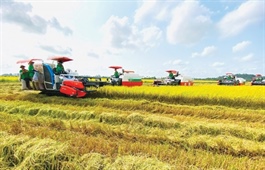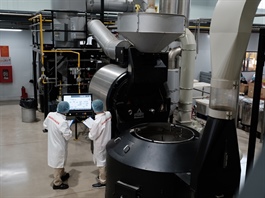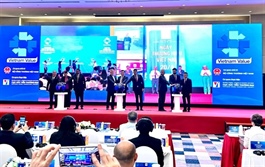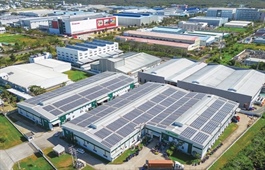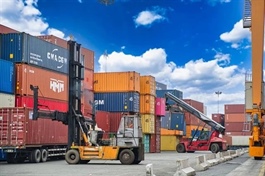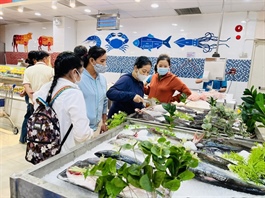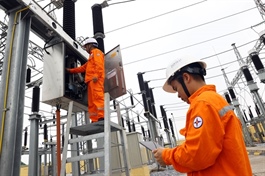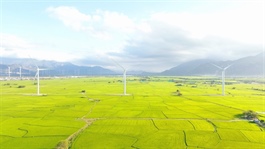Learning from the best in green production models
Learning from the best in green production models
According to the United Nations, Vietnam consistently ranks in the top half among nearly 200 countries in terms of sustainable development. This reflects the country’s comprehensive and inclusive development in meeting all the criteria set out by the UN 2030 Agenda for Sustainable Development. Vietnam is also among the responsible nations actively implementing this agenda.
According to the United Nations, Vietnam consistently ranks in the top half among nearly 200 countries in terms of sustainable development. This reflects the country’s comprehensive and inclusive development in meeting all the criteria set out by the UN 2030 Agenda for Sustainable Development. Vietnam is also among the responsible nations actively implementing this agenda.

Nguyen Quang Vinh, vice president, Vietnam Chamber of Commerce and Industry |
Vietnam has also made remarkable strides in green transformation and renewable energy. We have great advantages in harnessing naturally available clean energy sources. Wind energy, solar power, wave energy, and bioenergy are all potentials that, if properly utilised and developed, will greatly support the country’s green transition.
The government’s green growth strategy includes specific targets such as reducing greenhouse gas emissions, transitioning to green production in various economic sectors, conserving and recycling resources, promoting renewable energy efficiency and transition, and fostering green consumption and services. Therefore, there remains significant room across industries and sectors of the economy to shift towards a greener future.
We are entering a new era and a defining moment for Vietnam. As the global race for green transformation intensifies, markets such as China, South Korea, Japan, the European Union, and the United States are making major investments in green infrastructure and renewable technologies. Therefore, Vietnam must seize this opportunity to make breakthroughs in implementing renewable energy initiatives, thereby enhancing its competitiveness against other countries in the region and the world.
As competitiveness improves, Vietnam will attract more investment and access more green financing from the UN and financial institutions. As a result, our business community will also thrive further.
The business community has played a significant role in cooperating on new and responsible business models, creating new values for Vietnam’s inclusive growth, something that has been recognised globally.
The circular economy model, though not new globally, was first initiated by the community in Vietnam in 2015. According to business community assessments, the circular economy creates millions of jobs annually. It is becoming both the present and the future of the global economy.
Members of the Vietnam Business Council for Sustainable Development (VBCSD) are implementing many circular and sustainable business models. For example, a number of companies have emerged as early movers. Pharma group Traphaco, for example, has partnered with low-income communities in remote regions to develop inclusive business models. Vinamilk has embedded sustainability and circularity across its operations. Meanwhile, Vingroup has launched initiatives that signal a strong shift towards growth driven by environmental, social, and governance factors.
Yet, the challenge lies in expanding this momentum to all layers of the private sector. Small, medium, and micro-enterprises must also be equipped with the knowledge, tools, and incentives to participate meaningfully in the green transformation.
At its core, the global green race is a competition to lower emissions. Countries are increasingly shaping their policy environments to encourage low-carbon business practices, and Vietnam must do the same. In this context, the government’s role as coordinator and enabler becomes more critical than ever.
The Vietnam Chamber of Commerce and Industry and the VBCSD will continue to raise awareness among businesses, especially smaller enterprises, about green and sustainable growth.
At the same time, we continue to offer support to help businesses engage in international cooperation for sustainable development. Since 2013, the VBCSD has maintained the organisation of the Vietnam Corporate Sustainability Forum. This is one of the platforms that bring together many major companies in Vietnam and globally to discuss policy, exchange ideas, and share business models focused on circular economy and emissions reduction.
We will also coordinate with relevant ministries and international organisations to develop sets of indicators for sustainable industrial zones in Vietnam. This will be a major push for industrial areas to become more sustainable, attract more high-tech enterprises, and make greater contributions to Vietnam’s green growth.
The path forward is clear. As global competition intensifies, green transformation is no longer a niche goal; it is the foundation of future competitiveness. If Vietnam wants to lead, it must act decisively – mobilising businesses, shaping policy, and investing in the green economy, not tomorrow, but today.
- 11:44 17/04/2025







